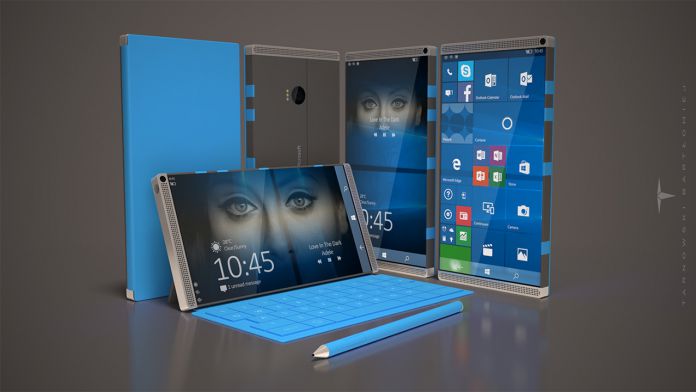The era of the folding screen is upon us and now the race is on amongst tech companies to release the best first-generation example of the technology. In mobile, LG and Samsung are amongst those competing. In terms of PC, Lenovo has already released a folding dual-screen laptop, and Microsoft and Dell are rumored to be close to a launch.
Microsoft is expected to launch its Surface Centaurus device in October, while Dell has long been working on its Janus folding screen hardware. As Lenovo and Dell are both Windows 10 partners, Microsoft is likely to be a winner in all scenarios.
Dell has filed two new patents regarding its foldable Windows 10 laptop. As we have seen with numerous Microsoft folding display patents, Dell is focused on the hinge mechanism.
In the patent, the company describes how Dell Janus will have a flexible sheet that can bend to make the hinge movable.
“The information sheet also has a first flexible sheet that bends at a different radius than a second flexible sheet. A mounting bracket fixes each of the flexible sheets to the information handling system, and a friction linkage engages with slots within the first and second flexible sheets. An organic light emitting diode is connected to the flex.

An information handling system includes a flex hinge having a first flexible film that flexes at a radius other than a second flexible film as the flex hinge is transferred from a first position to a second position. A mounting bracket secures each of the flexible panels to the information handling system, and a friction link engages slots within the first and second flexible panels. An organic light emitting diode is connected to the flexible hinge.”
Microsoft's Hinge Plans
Yesterday, we reported on a pair of Microsoft Patents that tackled the hinge mechanism on its own Surface Centaurus folding screen laptop.
In the latest Microsoft Patent ideas (published by Patentscope), shows that Surface Centaurus may feature a 360-degree hinge. There are two patents, the first describes how the hinge functions:
“The displays can rotate with respect to each other through 360 degrees. The displays can be face-to-face in a closed position, in a single plane in an open-book or tablet position, and back-to-back in a fully-open position. The hinge mechanism has at least one flexible connection member that follows a generally S-shaped path when the displays are in a tablet position.
“Each device can include a hinge lug that has top and bottom channels for receiving the flexible connection members. Both the first and second flexible connection members can be coupled together through a termination block. A screw can be threaded through the hinge lug and push on the termination block so as to create tension in the first and second flexible connection members.”
Last Updated on April 9, 2020 12:06 pm CEST by Luke Jones






